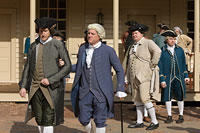Page content
Francis Fauquier
- Lieutenant governor of Virginia for 10 years
- Steady leadership during political crisis
- Cultivates intellectual acquaintances
- Provides for slaves in his will
Successful in business
Francis Fauquier was the oldest son of Dr. John Francis Fauquier, one of the directors of the Bank of England. His mother was Elizabeth Chamberlayne. Fauquier married Catharine, daughter of Sir Charles Dalston, but the date of their marriage is not known.
Fauquier rose to prominence in London as a financial writer and director of the South Sea Company in 1751. He served as deputy to two Virginia governors: John Campbell, the earl of Loudoun, and Sir Jeffrey Amherst. As lieutenant governor, Fauquier, unlike his superiors, lived in Williamsburg from 1757 until his death in 1768.
Leadership tested through political crises
Fauquier's administration encountered various difficulties, particularly during the French and Indian War. He set up defenses against Indian raids in the western lands and struggled to recruit and supply the colony's regiments who fought with British forces. Fauquier forged a compromise between colonials and English merchants over the issue of paper money.
Toward the end of his decade in office, he steered the colony through the Stamp Act crisis and the “Robinson Scandal,” when irregularities with the treasury became known upon the death of colony's Treasurer and Speaker of the House of Burgesses, John Robinson.
Intellectual circle of friends
His closest friends and allies in Virginia included Robert Carter III of Nomini Hall and William Nelson of Yorktown, both members of his Council; Attorney General and later Speaker of the House of Burgesses Peyton Randolph; Professor William Small of the College of William and Mary; the highly respected attorney and professor of law George Wythe; and a young and impressionable college student named Thomas Jefferson.
Years later, Jefferson wrote of the lieutenant-governor that he was “the ablest man” who ever ruled Virginia and recalled the group's conversations as stimulating and extremely important to his political development. Fauquier became a member of the Royal Society in 1753, and his observations on a 1758 hailstorm in Virginia were presented to the society.
Provisions for slaves in will
Fauquier’s enlightened ideas appear most clearly in his will. Written on March 26, 1767, almost exactly a year before his death, the will avows that slaves were “a part of my Estate in its nature disagreeable to me, but which my situation made necessary.” He felt morally obligated to provide for his enslaved workers and direct that children be kept with their mothers. Most surprisingly of all, he allowed the slaves to choose their next masters. Although he did not manumit them, Fauquier gave his slaves to make this critical decision that would affect the rest of their lives.
Having steered Virginia ably during times of political turmoil, the well-respected representative of the king in Virginia died in office on March 3, 1768.

